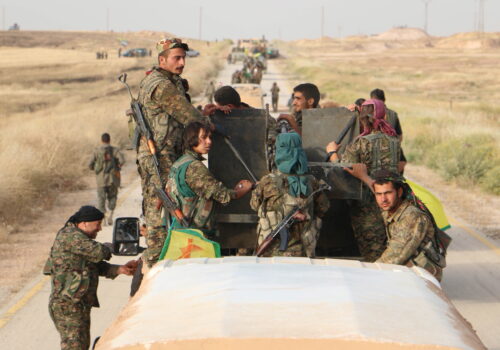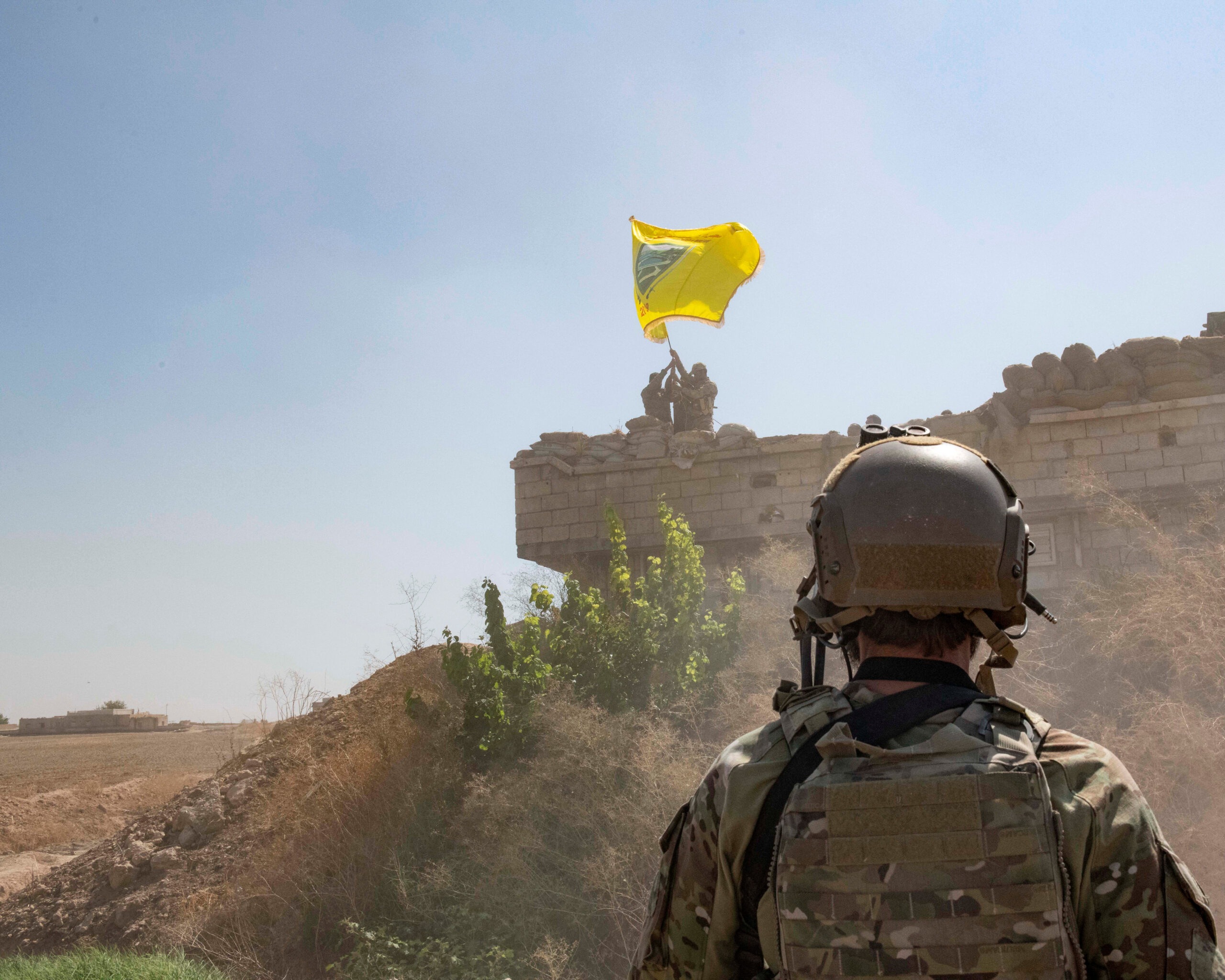Red lines and reconciliation: Turkey and Syria’s diplomatic gamble
August 15, 2024 • 10:40 am ET
Red lines and reconciliation: Turkey and Syria’s diplomatic gamble
Turkey’s motivations for re-engaging with Syria after ending ties in 2011 are driven by regional security concerns, domestic political pressures, and the broader geopolitical landscape. With that in mind, Ankara’s primary objectives include addressing the People’s Defense Units (YPG) threat, facilitating the return of refugees, and seeking political stability in Syria—actions that are heavily influenced by Russia and the United States. From Damascus’s perspective, reconciliation with Turkey is crucial for consolidating Syrian control over its future political landscape and achieving economic recovery through re-established trade links, but it remains wary of legitimizing Ankara’s military presence in its territory.
This article analyzes the evolving dynamics of Syria-Turkey relations, focusing on the key diplomatic milestones and the underlying factors influencing their interactions, and providing a comprehensive understanding of the path toward potential reconciliation. The objective is to identify the critical factors that could facilitate or hinder the normalization of relations between Damascus and Ankara.
Turkey’s intentions
The ongoing situation in Syria presents risks for Turkish security, prompting a search for viable solutions to its multifaceted challenges. Starting in 2019, developments in Syria have been shaped by shared Russian-US interests in preventing Turkish intervention in the country and, in particular, safeguarding the YPG-dominated Syrian Democratic Forces (SDF). The presence of the Russian military and the prospect of economic sanctions from the United States have repeatedly prevented Turkish efforts to launch military operations in Syria. At least three planned Turkish military operations appear to have been prevented because of these factors.
SIGN UP FOR THIS WEEK IN THE MIDEAST NEWSLETTER
Turkey urgently needs to address the situation in northeastern Syria, mainly because it has lost hope in the United States resolving its security concerns related to the YPG-dominated SDF. Ankara views the US partnership with the YPG, the Syrian branch of the Kurdistan Workers’ Party (PKK)—a designated foreign terrorist organization—as a national security threat.
As mentioned earlier, Turkey has three main objectives in Syria: to eliminate the YPG threat, facilitate the return of refugees, and seek a political solution for long-term stability. There is growing anti-refugee sentiment in Turkey and the Turkish opposition is gaining strength, putting pressure on the government to address the refugee crisis. Domestic politics significantly influence Turkey’s involvement with Damascus as the government aims to ease public discontent and bolster its political position.
Furthermore, Russia has conducted a successful propaganda campaign targeting the Turkish public and decision-makers, shaping perceptions, and influencing policy decisions. This campaign has further emphasized the supposed benefits of talking with Damascus.
Turkey didn’t perceive a realistic policy option to cooperate with the United States in Syria and pursue talks with Damascus. Speculation about a possible US withdrawal from Syria due to the upcoming US elections in November and a new momentum in Turkish-US relations resulted in Ankara hoping for a joint approach with Washington. However, the United States’ refusal to abandon the YPG continues to be the main barrier to reaching any agreement.
As Turkey cannot achieve its objectives given opposition from Russia and the United States, and Washington has yet to provide Ankara with a viable alternative, Turkey is willing to consider the option proposed by Russia. President Recep Tayyip Erdogan has acknowledged the need for an exit strategy from Syria, a reality recognized across the Turkish political spectrum. The main issues concern Syria’s conditions and the nature of governance there. Erdogan has emphasized the need for a new social contract in Syria that would ensure the safe return of refugees and address Turkey’s security concerns.
The Russian strategy
Russia’s efforts to pressure Turkey into a military retreat from Syria suffered a significant setback in 2020, when the Turkish Armed Forces effectively defeated regime forces after the unfortunate loss of thirty-four Turkish soldiers. This event exposed the limits of Russia’s power and necessitated a reassessment of its strategy toward Turkey and the broader Syrian crisis.
While Russia has been focused on the invasion of Ukraine, its strategy in Syria has been aimed at preventing a situation in which a fait accompli by another actor diminishes its influence. Russia is actively pursuing a plan to secure its ongoing presence and control in Syria, while also preventing Western powers or their regional allies from establishing a solid position in Damascus. This strategic maneuvering is essential for Moscow to maintain its geopolitical leverage in the Middle East.
Turkey remains the primary obstacle to a decisive Russian victory in Syria. Moscow recognizes that, to surmount this impediment, it must actively involve Ankara in a manner congruent with Turkey’s interests, which only sometimes coincide with those of Western countries. Russia believes that Turkey is pursuing an autonomous agenda in Syria, which might deviate from the objectives of Western countries. This autonomy presents both a challenge and an opportunity for Russian diplomacy.
Russia is greatly concerned about the possibility of a Turkish-US agreement regarding Syria, particularly considering the potential future withdrawal of US forces from the area. This agreement could weaken Russian interests, leading Moscow to influence Turkey’s position actively. In the worst-case scenario for Russia, negotiations between Ankara and Damascus could serve as a stalling tactic, buying time until the situation in Ukraine stabilizes or the United States withdraws from Syria.
Russia has skillfully capitalized on Turkey’s concerns about migration to benefit itself. At first, it used the tactic of threatening to attack internally displaced persons (IDPs) along the border between Turkey and Syria to put pressure on Ankara. Presently, Russia is implementing an all-encompassing propaganda strategy intended to persuade the Turkish population that engaging in negotiations with Damascus is the definitive resolution to Turkey’s refugee crisis. This psychological and media campaign aims to alter public opinion and enable diplomatic talks.
Moscow is invoking the 1998 Adana Protocol, which would officially legitimize the Turkish military’s existence in Syria, to promote a consensus between Ankara and Damascus. Nevertheless, this proposal would require a thorough examination and possible protocol enhancement to make it more attractive to Ankara. Russia’s proposal for a formal and globally acknowledged military presence is intended to give Turkey a feeling of safety and credibility in its actions, thus creating a favorable atmosphere for diplomatic talks.
Damascus’s position
Reconciliation with Turkey, the last-standing primary regional adversary, is crucial to completing Syria’s narrative of victory. The prevailing sentiment in Damascus is that mending ties with Ankara would deliver a significant blow to the opposition, further impeding the implementation of United Nations Security Council Resolution 2254 (UNSCR 2254). By reconciling with Turkey, Syria could strategically undermine the opposition’s position in the negotiations and strengthen its stance. This would help Syria consolidate its control over its future political landscape.
Syria would have preferred to negotiate with a Turkish government other than the one led by President Erdogan. Opposition parties in Turkey have demonstrated more eagerness to engage with Syrian President Bashar al-Assad and are less bound to impose burdensome conditions for reconciliation on Damascus. Syria must confront the current reality of Erdogan’s government, which holds power despite its contentious position. The general sentiment in Damascus is that a potential reconciliation with Ankara should lead to only a limited amount of diplomatic interaction, allowing Syria to maintain some influence for possible future negotiations with a more favorable Turkish government. By adopting this pragmatic approach, Damascus can effectively navigate the intricate dynamics of Turkish politics while maintaining flexibility in its long-term strategic choices.
Moreover, re-establishing diplomatic relations with Turkey would significantly influence opposition armed factions in northern Syria. If Ankara changes its position, these groups—many of which depend on Turkish support—would experience a substantial decline in their influence. By ensuring that Turkey is held responsible for their actions, the opposition from these factions is anticipated to decrease significantly. Additionally, this normalization could resolve the stalemate in negotiations with the YPG-dominated SDF. The process of reconciliation with Turkey has the potential to either result in Kurdish communities making further concessions or lead to the formation of a united anti-YPG front by antagonistic Arab communities, with the support of Ankara. This transition has the potential to result in a more united and secure northern Syria, which aligns with Damascus’s broader strategic objectives.
Reconciliation with Ankara also carries substantial economic and financial incentives. Regaining partial or complete control over Turkey’s borders would provide Syria access to international trade routes, which would be crucial for economic recovery. The Syrian economy, severely damaged by prolonged conflict and financial restrictions, urgently needs opportunities for expansion and progress. Despite Turkey’s interest in other regional connectivity projects, Syria’s connectivity remains more feasible and cost-effective. The strategic advantage of re-establishing trade links with Turkey highlights the economic imperative for Syria to pursue normalization.
Nevertheless, Damascus has substantial apprehension about the validation of the Turkish military’s presence in Syria. Damascus might lose vital leverage in future discussions with Ankara by acknowledging or temporarily legitimizing this presence. As a result, Syria, with Tehran’s backing, is expected to consistently insist on the complete withdrawal of the Turkish Armed Forces from northern Syria as a prerequisite for reconciliation.
As Syria and Turkey navigate this new phase of diplomacy, the path to reconciliation remains fraught with uncertainty and complex technical negotiations. While recent developments hint at a thaw in relations, the demands and concessions required from both sides are more complicated. A photo-op between leaders might offer a symbolic victory, but it is the most accessible milestone in a future filled with arduous discussions and complex agreements. The real test lies ahead as both countries strive to address deep-seated issues, balance regional interests, and forge a sustainable path forward amid enduring skepticism.
Sinan Hatahet is a nonresident senior fellow for the Syria Project at the Atlantic Council’s Middle East Programs and vice president for investment and social impact at the Syrian Forum.
Ömer Özkizilcik is a nonresident fellow for the Syria Project in the Atlantic Council’s Middle East Programs.
Further reading

Tue, Aug 6, 2024
Can northeast Syria delink from the PKK?
MENASource
By
The United States needs effective allies in the northeast to stabilize the area and block an ISIS resurgence, while Turkey must prevent the entrenchment of a PKK-led statelet on its border.
Image: A U.S. soldier oversees members of the Syrian Democratic Forces as they demolish a YPG fortification and raise a Tal Abyad Military Council flag over the outpost as part of the security mechanism zone agreement, in Syria September 21, 2019. Picture taken September 21, 2019. U.S. Army/Staff Sgt. Andrew Goedl/Handout via REUTERS



